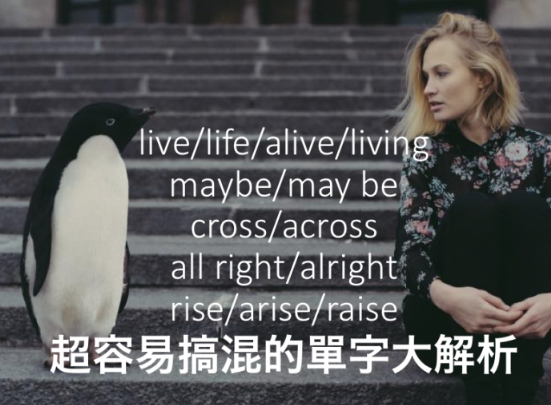live vs. life vs. alive vs. living
live
有动词、形容词、副词的用法
当动词时 (v.),k.k 发音是 /liv/
1. 生存
Do you work to live or live to work?
你是为活着工作还是为工作而活?
2. 生活,过日子。
He lives an abandoned life.
他过着放荡的生活
3. 居住。
They live in the apartment above ours.
他们住在我们楼上的公寓里
用这首黎安莱姆丝的《How Do I Live?》来帮助你记起来这个单字吧!
当形容词时 (adj.),k.k 发音是 /laiv/
1. 活的,有生命的。 a live fish 活鱼
2. 目前大家感觉兴趣的,当前的。 a live issue 尚在争论中的问题
当副词时 (adv.),发音是 /laiv/
现场直播,实况地。
The trial was broadcast live from the courtroom.
审判情况是从审判室实况转播的。

life
这个词大家应该比较不容易搞混,它当名词 (n.),有的意思有「生命, 生活, 一生, 寿命, 生命力」等等
除了歌曲,许多励志的演讲的主题都环绕着「人生」,不难听到 your life, my life 等话语
alive
这个词常常跟 live 搞混,它是形容词 (adj.),意思是活着的、活泼的、有生气的
Keeping someone alive like this is an affront to human dignity.
如此维持一个人的生命是对人类尊严的冒犯。
Our dream keeps us alive.
梦想使我们活着
living
也有形容词、名词、动名词的用法
1. adj. 活着的、现存的、在使用中的、逼真的。 living creature 生物
2. n. 生计、生活方式。 Make a living from … 靠….过生活、讨生活
3. ger. 活、居住(当作 live 的现在分词)像是:
My son is living abroad.
我的儿子住在国外。
may be vs. maybe
maybe
副词,意思是「也许、可能」,像是 perhaps、possibly
Maybe she’ll come in the office this afternoon.
她可能今天下午会来办公室。
Maybe you left your laptop on the train.
你可能把笔电忘在火车上了。
may be
may 是情态动词,be 是动词原形,意为「也许是、可能是」,像是英文的 “might be” 或 “could be”。
I can’t find my watch. It may be in your pocket.
我找不到我的手表了,它可能在你的口袋里。
I may be going out tonight.
我今晚有可能会出门。
all right vs. alright
all right
用法是 “acceptable for all forms of writing”,也就是在各种写作里,不管是书信、剧本、小说等等都可以用。
第一个意思是「适当地」
The room looks all right in the magazine.
杂志里面的房间看起来都相当妥当的。
第二个意思是「准许」,你如果想要进到别人房间,可以询问。
Is it all right that I come in?
我可以进来吗?
alright
通常是用在日常对话中,第一个意思是「好的」。
Alright! Alright! I’ll fix it!
好啦好啦我会处理!
第二个意思是「满意地」。
Does my ass look alright in these jeans?
这条牛载裤穿在我身上 (屁屁) 好看吗?
across vs. cross
across
是介系词或副词,也是度过、穿越的意思。
We walked across the street.
我们走到对街
cross
及物动词, 是越过, 渡过的意思。
We crossed the street.
我们穿过马路
意思相近,词性以及使用场合有所不同,不同的地方是 across 本身不是动词。所以要加上动词,变成 “walked across” 来描述「用行走的方式穿越」。
all ready vs. already
all ready
关键字是 ready (adj) 指有准备的,all 只是在强调「全部」而不是「准备一半或稍微准备」。
Linda is all ready for her wedding tomorrow.
Linda 为她明天的婚礼准备妥当。
already
(adv.) 已经,指某事物早已发生。
When I arrived in the airport my plane had already taken off.
当我到达机场时我的班机已经起飞了。
anyone vs. any one
anyone
anyone 是不定代名词,意为「任何人」(any person),通常用于否定句、疑问句及条件句,当主词用时,接单数动词。
Did anybody hear of such a thing?
有谁听说过这样的事吗?
Anyone can cook because it’s easy.
任何人都会做饭,因为那很容易。
any one
Any one 是一个由 any 所修饰的代名词或形容词,意为「任何一个人」(any single person) 或「任何一件事情或一样东西」(any single thing)
Any one of them may speak at the meeting.
他们任何人都可以在会议中发言。
Linda has more work than any one person can handle.
琳达的工作量比任何人所能处理的工作量都要来得多。
raise vs. rise vs. arise
raise
raise 是及物动词,后面要加受词。
Raise your hand before asking a question.
问问题之前需要先举手。
rise
rise 是不及物动词,后面不用加受词的。
The sun rises in the east.
太阳从东边升起。
也可以当作名词,意思为上升。
There is a general rise in prices in the late 60’s.
六零年代晚期价格发生普遍的上涨。
arise
arise 是「不及物动词」,意思是「站立」、「起床」,惯常用法是指「事情的发生」。 Arise from/ out of… 即「由…造成」。
How did this quarrel arise?
这个争纷是怎么发生的?
awake vs. wake
awake
awake 作形容词用,意即「醒着」
I was awake all night。
我一整晚都醒着。
wide awake 即「完全清醒的」;stay awake 即「保持清醒」。再用一首歌让你印象更深刻:Katy Perry 的《Wide awake》大家有没有听过呢?
wake
也就是一般的动词,意思是起床、唤醒。
Wake up!!!!!
起床! ! (可以想像妈妈的声音在耳边环绕)
最后,如果你也搞不清 small/little, big/large, tall/high 这些中文听起来都一样的英文单字,那么你应该会需要这部影片:







